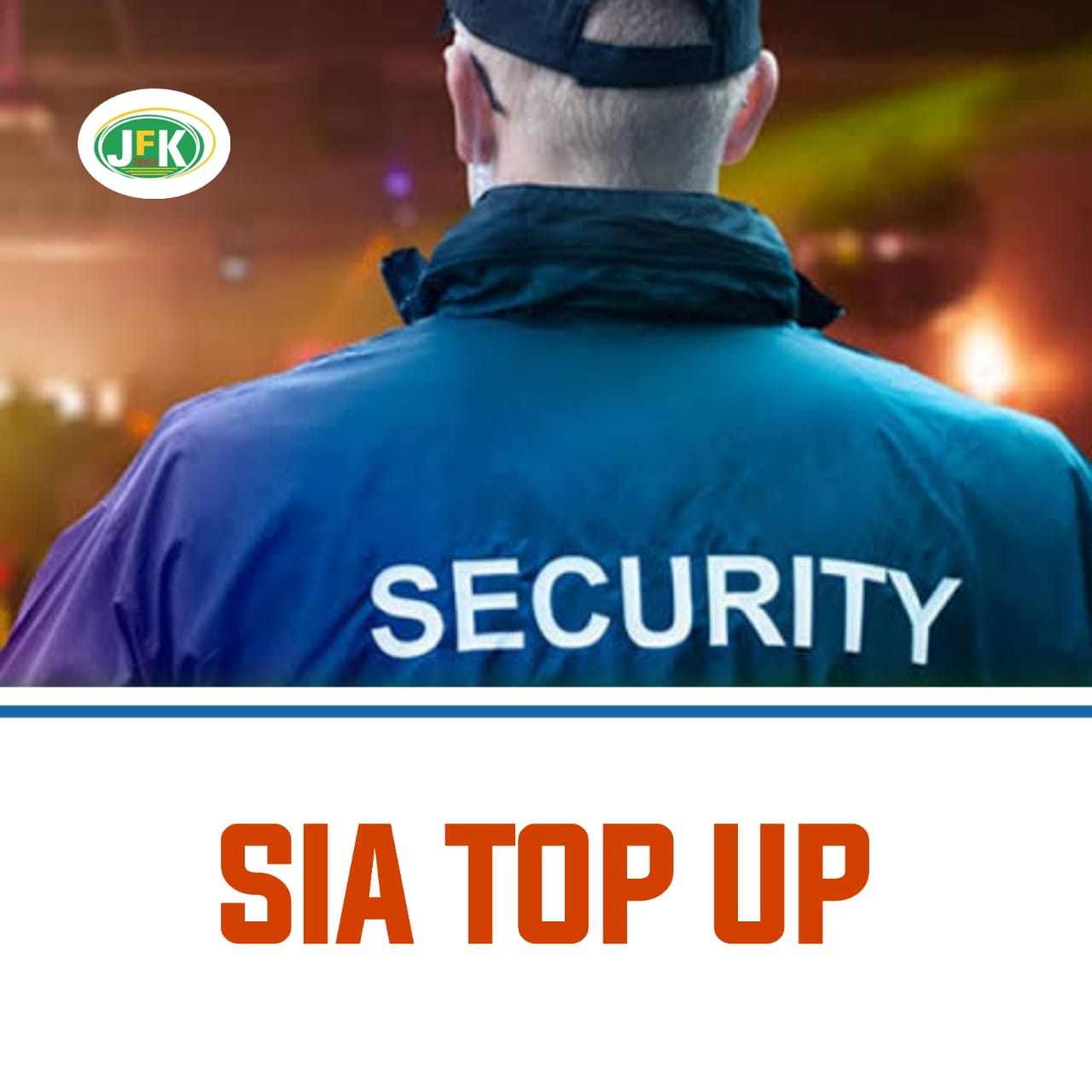Starting a career after SIA door supervisor training can open numerous opportunities in the UK’s thriving security industry. If you’ve recently earned your SIA Door Supervisor License, you’re likely wondering what the next step should be. The good news is that there are several dynamic, rewarding, and well-paid career paths you can pursue right now.
This guide explores the top 5 career opportunities you can pursue after completing your SIA training. We’ll also cover door supervisor job roles, salary expectations, industry demand, and promotion prospects so you can make informed decisions and plan your career growth effectively.
Why Consider a Career After SIA Door Supervisor Training?
The Security Industry Authority (SIA) is the regulatory body overseeing private security roles in the UK. With over 400,000 active license holders as of 2025, the SIA certification is not just a legal requirement, it’s a powerful tool to unlock employment opportunities in one of the UK’s most essential sectors.
Security roles are increasingly in demand, with employers ranging from nightclubs and shopping centres to corporate headquarters and music festivals. By holding an SIA Door Supervisor License, you gain access to jobs that offer stable income, flexible schedules, and defined career paths. More importantly, the certification qualifies you to work on both licensed and unlicensed premises, giving you broader employment options.
From corporate security to event management, your door supervisor training can lead to several high growth roles, many of which offer excellent promotion prospects and competitive salary expectations.
Top 5 Career Paths After SIA Door Supervisor Training
1. Corporate Security Officer
One of the most professional and structured environments you can work in post, certification is corporate security. As a corporate security officer, your responsibilities often include monitoring CCTV systems, conducting patrols, controlling building access, and responding to security incidents. These roles typically operate during business hours, with some exceptions depending on the level of risk involved.
Salaries for corporate security officers usually range between £25,000 and £35,000 per year, with scope for additional benefits such as pension contributions, overtime, and bonus schemes. Promotion opportunities include positions like Senior Officer, Security Manager, and eventually, Head of Security or Facilities Lead.
2. Event Security Supervisor
If you enjoy working in lively environments, event security might be the ideal path. From music festivals to sports matches, trained door supervisors are essential for managing large crowds, controlling access points, and ensuring public safety during high, attendance events.
SIA, licensed professionals can earn between £12 to £20 per hour in this field, depending on experience and the type of event. With time and experience, you can advance to roles like Team Leader, Site Manager, or Event Security Coordinator. While demand can be seasonal, the summer and holiday periods often bring a surge in available roles.
Having additional training in Emergency First Aid or Fire Safety will not only enhance your capabilities but also make you a top candidate for supervisory roles.
3. Nightclub and Hospitality Venue Security
Working in nightclubs, pubs, and other hospitality venues is one of the most common job roles for newly licensed SIA professionals. Your main duties would include checking IDs, managing guest lists, monitoring behavior, and responding to incidents.
These roles often require strong people skills, quick decision, making, and the ability to remain calm under pressure. Salaries typically range from £10 to £18 per hour, with higher wages often offered for weekend or late, night shifts.
Many professionals begin here and rise to become Head Door Supervisors or Venue Security Managers. The nightlife industry always needs capable, licensed professionals, especially in cities with vibrant bar and club scenes like London, Manchester, or Birmingham.
4. Retail Security Specialist
Retail security is another popular path for door supervisors looking for more structured, customer, facing roles. Your duties might include preventing theft, conducting bag checks, liaising with store managers, and writing incident reports.
This job requires vigilance, conflict resolution skills, and excellent observation. The average salary for retail security professionals is between £22,000 and £30,000 annually. As you gain experience, you can move into roles such as Loss Prevention Officer, Store Detective, or even Asset Protection Manager.
Retail chains often hire long, term contracts, offering job stability and career progression. The demand is especially high during peak shopping seasons such as Black Friday and Christmas.
5. Mobile Patrol and Response Officer
Mobile patrol officers work across multiple sites and are often employed by security companies that offer 24/7 protection for industrial sites, offices, and other vulnerable properties. This role provides variety and independence, making it ideal for those who don’t want a static post.
You’ll need a full UK driving license, good navigation skills, and flexibility for night shifts. Expect to earn between £24,000 and £34,000 per year, with potential bonuses for unsocial hours or emergency responses.
Career advancement could lead to positions like Mobile Patrol Supervisor, Area Response Manager, or Operations Coordinator. The job often includes key holding responsibilities, so trustworthiness is essential.
Understanding Door Supervisor Job Roles and Responsibilities
A door supervisor’s responsibilities go beyond just “standing at the door.” You are expected to maintain the safety of customers and staff, manage entrances and exits, check identification, monitor intoxicated or aggressive individuals, and defuse conflicts.
The SIA training prepares you for all of this through modules in physical intervention, conflict management, and legal responsibilities. With real world experience, you’ll gain the communication and situational awareness skills necessary to move into leadership roles or specialized fields such as close protection or surveillance.
Promotion Prospects and Long, Term Growth
One of the strongest benefits of working in the security industry is clear promotion prospects. By starting as a door supervisor, you can gradually work your way up to managerial or specialist positions.
Here’s a simplified career ladder:
- Entry, Level: Door Supervisor, Security Guard
- Mid, Level: Team Leader, Event Supervisor, Site Manager
- Senior, Level: Operations Manager, Security Consultant, Regional Security Director
To fast, track your advancement, consider adding complementary qualifications like a CCTV Operator License, Close Protection Training, or First Aid Certification. These not only expand your job eligibility but also signal employers that you’re serious about your career development.
Salary Expectations in the UK Security Industry
Salaries in the security industry are influenced by experience, location, risk level, and shift type. Here’s a quick overview of current market trends:
- Entry, Level Door Supervisor: £22,000, £25,000/year
- Corporate Security Officer: £30,000 , £35,000/year
- Nightclub Security: £10 , £18/hour
- Event Security: £12 , £20/hour
- Mobile Patrol Officer: £24,000 , £34,000/year
- Security Manager: £40,000 , £60,000/year
Additionally, roles with night shifts, travel, or increased risk often offer shift allowances and overtime rates, increasing your total income.
Industry Demand for SIA, Certified Profession
The security industry in the UK continues to grow in response to an increased focus on public safety, risk management, and compliance. According to the British Security Industry Association (BSIA), the sector is currently experiencing a talent shortage, especially for qualified individuals holding a valid SIA license.
Increased foot traffic in retail stores, resurgence of large, scale public events, and stricter building safety regulations are all driving this demand. Now is a particularly good time to take advantage of the growing need for skilled security professionals.
If you’re unsure where to look for your next job, explore platforms like Indeed Security Jobs or check out official guidance on the GOV.UK SIA portal.
Final Thoughts on Career Progression After SIA Door Supervisor Training
A career after SIA door supervisor training offers far more than just a job, it opens the door to a secure, flexible, and rewarding future. Whether you’re drawn to corporate security, events, retail, or patrol services, the skills and credibility provided by your SIA License give you a strong foundation.
By staying proactive, gaining experience, and investing in additional qualifications, you can achieve long, term success in the security sector. With growing industry demand, strong promotion prospects, and varied door supervisor job roles, now is the perfect time to take your career to the next level.
FAQs, Career After SIA Door Supervisor Training
What jobs can I do after SIA Door Supervisor training?
You can work as a security officer in events, retail, corporate offices, nightclubs, and mobile patrol services. Additional training opens up roles in CCTV monitoring, close protection, and more.
Can I become a manager with only the Door Supervisor License?
Yes, with experience and extra training, many professionals advance to team leader, site manager, or regional operations roles.
Is there a difference between a door supervisor and a security guard?
Yes. A door supervisor can legally work in licensed premises like bars and nightclubs, while a standard security guard cannot unless they hold the Door Supervisor License.
How long is the license valid?
Your SIA Door Supervisor License is valid for three years. You must renew it before it expires to continue working legally.
What’s the best long, term goal after working as a door supervisor?
Many choose to move into security management, start their own firms, or specialize in areas like close protection or surveillance. Your career can grow rapidly with the right training and experience.


